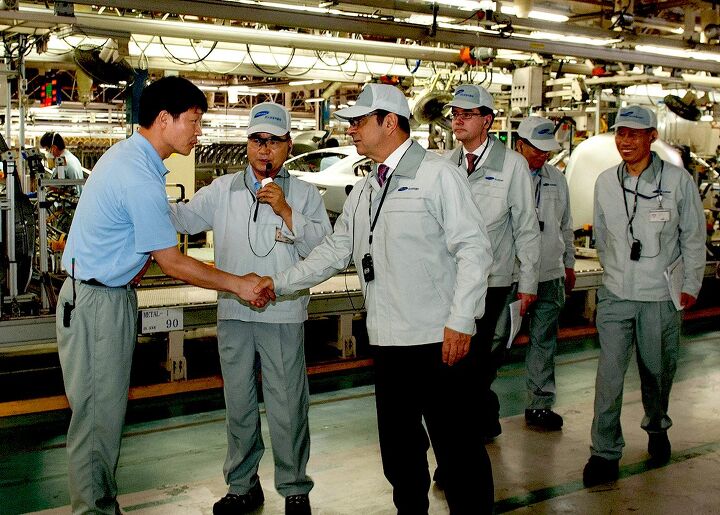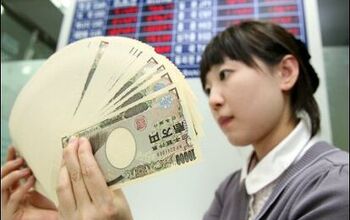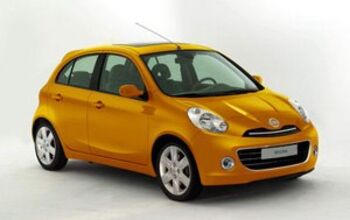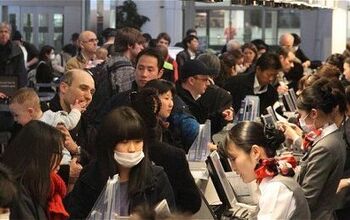The High Yen Drives Japanese Automakers Out Of The Country

Less than a year ago, the Tokyo automotive press corps was summoned to Kyushu, the southernmost of the four main Japanese islands to visit a Nissan plant. Nobody knew why, until Nissan CEO Carlos Ghosn had one of his trademark impromptu outbursts. He called the exchange rate “abnormal,” several times, until everybody got it. He threatened several times that Nissan and most of the Japanese industry would pack up and leave, and delivered an ultimatum: “If six months down the road we are still in this situation, then this will provoke a rethinking of our industrial strategy.”
It is now ten months later, and the situation has not changed. At lest not on the currency charts. The yen is as deviant as it was when we were in Kyushu. Today, Carlos Ghosn is some 150 miles away from that Nissan plant. He is across the water in Busan, South Korea, where he announces a $160 million investment into Renault’s plant with Renault Samsung Motors (RSM). The money is used to install equipment to produce the Nissan Rogue in 2014 “with an annual capacity of 80,000 units.”
“Most of the Rogue SUVs built in Busan will be exported from 2014,” a Nissan spokesman told Dow Jones via The Nikkei [sub].
It is a logical choice. The plant across the water was underused, it even had to shut down for a few days. The South Korean Won remains steadily cheap against the dollar. South Korea has a free trade agreement with the U.S. and the EU, and is negotiating deals with Canada and Mexico. It also is one of these cases where free trade agreements mean jobs.
In the meantime, the “hollowing out” of the Japanese industry continues. Most Japanese automakers exported their growth elsewhere and are engaged in a holding action at home. Nissan is turning South Korea into the export base Japan used to be.

Bertel Schmitt comes back to journalism after taking a 35 year break in advertising and marketing. He ran and owned advertising agencies in Duesseldorf, Germany, and New York City. Volkswagen A.G. was Bertel's most important corporate account. Schmitt's advertising and marketing career touched many corners of the industry with a special focus on automotive products and services. Since 2004, he lives in Japan and China with his wife <a href="http://www.tomokoandbertel.com"> Tomoko </a>. Bertel Schmitt is a founding board member of the <a href="http://www.offshoresuperseries.com"> Offshore Super Series </a>, an American offshore powerboat racing organization. He is co-owner of the racing team Typhoon.
More by Bertel Schmitt
Latest Car Reviews
Read moreLatest Product Reviews
Read moreRecent Comments
- Normie Khan, apprised of the promotion: "Ah.. Admiral Obvious.."
- Jalop1991 so, the same management team that came up with the CR-Z assigned themselves to this project. Got it.
- MaintenanceCosts Nobody would be upset about this at all if Honda had branded it "Civic Coupe." But it wouldn't have as much buzz either. My guess is that the Prelude branding will drive an initial shot of sales but in the long term the Civic Coupe name would have been the better choice.Also: I'm expecting that the usual testers with their usual methods will get a roughly 6.5s 0-60 out of this car. There's just no way that 200 hp + roughly 3200 lbs. gets you a 9s 0-60.
- Oberkanone Sunroof on every previous Prelude. Until now.
- Dave M. List of sporty 2-door hybrids:[list=1][*]Honda Prelude[/*][*]Nothing[/*][/list=1]It's a niche target crowd but it'll sell if Honda is realistic about market size and price for this.


































Comments
Join the conversation
Sometimes I wonder if Nissan should just get rid of conventional press releases and instead send out galleries of Carlos Ghosn gesturing. Not only does he look related to Rowan Atkinson, he's almost as expressive.
The Japanese government has bought down the yen for half a century but with the nuclear disaster/tsunami/earthquake, the government can no longer afford this. Maybe the stronger yen will allow the Japanese consumer to buy more American products.